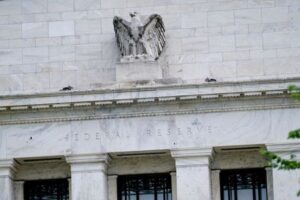By Promit Mukherjee and Ismail Shakil
OTTAWA (Reuters) -Consumer prices in Canada took an unexpected turn and rose in May, data showed on Tuesday, after showing signs of an almost consistent cooling since the start of the year, forcing markets to trim hopes of a rate cut in July to below 50%.
The Bank of Canada, which cut interest rates for the first time in four years this month, has repeatedly maintained that the path towards further easing of rates would be data dependent, and May’s inflation data dampens the chance of an immediate rate cut.
“No bones about it, this is not what the Bank of Canada wanted to see at this point, and clearly shaves the odds of a follow-up July rate cut,” said Douglas Porter, chief economist at BMO Capital Markets, adding that the next rate cut is likely to be in September.
The annual inflation rate accelerated to 2.9% in May from 2.7% a month ago, while key measures of core inflation – closely tracked by the BoC – edged up for the first time in five months, Statistics Canada said.
Money markets heavily trimmed their bets and now see a 45% chance of a rate cut in July, from over 70% seen on Monday.
The Canadian dollar pared early losses and firmed by 0.07% to 1.3663 against the U.S. dollar, or 73.28 U.S. cents.
Analysts polled by Reuters had forecast inflation to cool to 2.6%. Month-over-month, the consumer price index was up 0.6%, exceeding a 0.3% rise forecast.
The surprise acceleration in headline inflation was driven by prices for services including cellular services, travel tours, rent and air transportation, Statscan said.
CPI-median and CPI-trim, the Bank of Canada’s preferred measures of underlying inflation, rose for the first time since December, contrary to market expectations.
CPI-median sped up to 2.8% from 2.6% in April while CPI-trim accelerated to 2.9% from 2.8%. Economists had forecast CPI-median to remain at 2.6% and CPI-trim to be 2.8%.
Citing progress in bringing down inflation, the central bank lowered its policy rate to 4.75% earlier this month and said decisions to ease further would be taken one meeting at a time.
Its next meeting is on July 24 before which it will have the benefit of one more inflation reading, along with the GDP number for May and jobs report for June.
But economists and analysts believe the BoC might want to slow down.
“We suspect an abundance of caution will see the next move land in September, matching the timing of the first rate cut from the Federal Reserve,” said Karl Schamotta, chief market strategist at Corpay.
In May, grocery price growth accelerated for the first time since June 2023, Statscan said, noting that prices for groceries have risen 22.5% compared with May 2020. Annual energy price inflation slowed to 4.1% from 4.5% in April.
Excluding volatile food and energy, prices rose 2.9% compared with a 2.7% rise in April.
Overall, service prices increased 4.6% in May, compared with a 4.2% rise in April, while goods inflation remained at 1%.
Mortgage costs, owing to higher interest rates, continued to rise but its pace slowed marginally to 23.3%. Rental inflation, however soared to 8.9% after slowing to 8.2% in April.
(Reporting by Ismail Shakil and Promit Mukherjee; Additional reporting by Dale Smith; Editing by Emelia Sithole-Matarise and Nick Zieminski)





